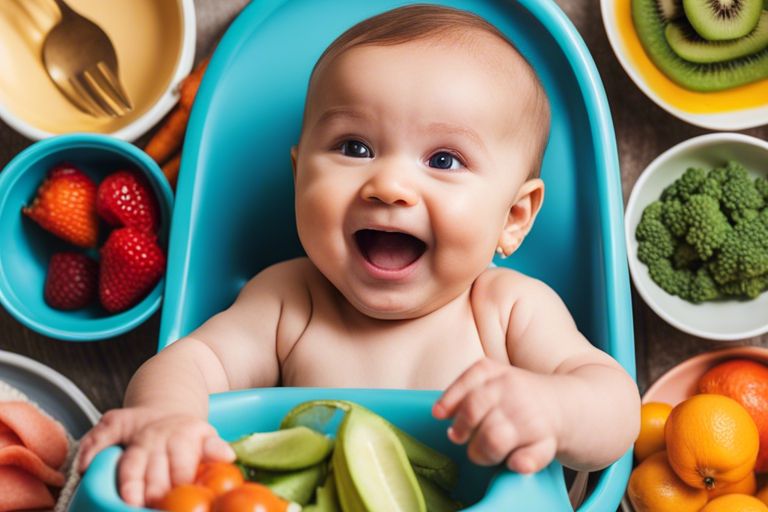tips, tricks and guides for parenthood
Just welcomed a new little one into your family? Congratulations! As your baby grows, you'll soon reach the exciting milestone of introducing solids into their diet. Knowing the right time and way to start solids can be vital for both their health and development. In this guide, we'll cover the importance of starting solids at the correct age, how to recognize signs of readiness in your baby, and tips for a smooth transition to solid foods. Stay tuned for expert advice and helpful tips to make this journey a joyful and memorable one for both you and your little food explorer!

You may be wondering when to start introducing solids to your baby. Factors that influence this decision include your baby's age, developmental readiness, appetite, and doctor's recommendations. Bear in mind, every baby is unique, so it's crucial to observe their cues and consult with a healthcare professional before making any changes. This will ensure a smooth transition for your little one.
For a successful start to your baby's solid food journey, make sure you have the crucial equipment ready. This includes a high chair, bibs, soft-tipped spoons, small bowls, and BPA-free baby plates. Safety is key, so always ensure that food is served in appropriate portion sizes and avoid any choking hazards. Thou can never be too careful when it comes to your baby's well-being.
Plus, always supervise your baby during meal times and introduce one new food at a time to check for any allergies. Creating a safe and positive feeding environment is crucial for your baby's overall development and enjoyment of food. Bear in mind, this is an exciting milestone for both you and your little one, so enjoy the messy but fun journey of introducing solids!
Foods high in iron and zinc are great choices for your baby's first foods as these nutrients are important for their growth and development. Pureed meat, poultry, fish, or iron-fortified cereals are excellent options to start with.
There's no need to rush when introducing solids to your baby. Take it one step at a time and be patient. Here is a simple guide to help you get started:
| Step 1 | Sit your baby in an upright position. |
| Step 2 | Offer a small amount of food on a soft-tipped spoon. |
| Step 3 | Wait for your baby to open their mouth before offering more. |
| Step 4 | Avoid force-feeding and let your baby set the pace. |
With time and patience, your baby will gradually learn to eat solid foods. Remember to introduce one new food at a time and watch out for any signs of allergies. Enjoy this exciting journey with your little one!
Despite When Can My Baby Start Eating Solid Foods? (for Parents), it's important to know how to progress with introducing solids to your baby. As they grow, their needs and capabilities change, so adapting their diet is crucial for their development.
Now is the time to introduce more textures and a variety of foods to your baby's diet. You can start offering soft finger foods, mashed fruits and vegetables, and even small portions of family meals (without added salt or sugar). This will help them get used to different tastes and improve their chewing abilities.
To create balanced meals for your baby, make sure to include a mix of crucial nutrients in each meal. Remember to offer foods rich in iron, such as meat or fortified cereals, to support their growth and development. Any drastic changes should be introduced gradually to avoid any digestive issues.
Another important tip is to observe your baby's reactions to new foods carefully. Watch out for any signs of allergies or choking hazards and be prepared to adjust their meals accordingly. Be mindful of, every baby is different, so what works for one may not work for another.
Setbacks are common when introducing solids to your baby. Some common concerns that parents face include difficulty in transitioning from milk to solids, food allergies, and digestive issues. It's important to stay patient and observant during this period.
Challenges with picky eaters can be disheartening, but there are strategies that can help. Encouraging variety in their meals, involving them in meal preparation, and creating a positive mealtime environment can make a difference. Be mindful of, it may take several tries before a new food is accepted.
With these considerations in mind, introducing solids to your baby can be an exciting journey. Remember to wait until around six months, observe your baby's signs of readiness, offer a variety of nutritious foods, and always consult with healthcare professionals if you have any concerns. Starting solids is a significant milestone in your baby's development and can be a fun and rewarding experience for both you and your little one. Enjoy watching your baby explore new tastes and textures, and remember to cherish these precious moments as they grow and thrive on their solid food journey.
A: It is recommended to start introducing solids to your baby when they are around six months old.
A: Signs that your baby is ready for solids include sitting up with minimal support, showing interest in what you're eating, and being able to swallow food (rather than pushing it out with their tongue).
A: Good first foods to introduce to your baby include iron-fortified baby rice cereal, pureed fruits (such as apple or pear), and pureed vegetables (such as sweet potato or carrot).
A: Start by offering your baby a small amount of food on a spoon. Let them taste and explore the new textures. Gradually increase the amount and variety of foods as they get more comfortable with eating.
A: Yes, continue to offer your baby breastmilk or formula alongside solid foods. Breastmilk/formula will still be their main source of nutrition until they are around one year old.